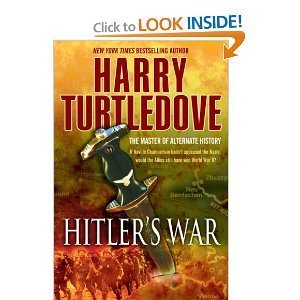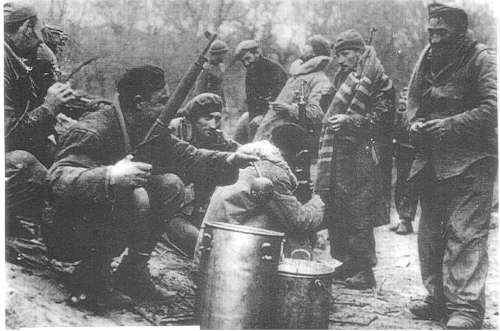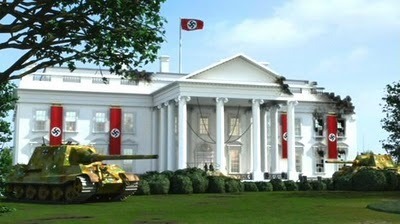Sebastian P. Breit's Blog, page 23
July 30, 2011
Red Tails - The Tuskegee Airmen
It looks inspirational, the production values seem to be top notch, it has good actors: seems that after a dearth of a couple of years, we might have a bonafide war movie coming up again!
Published on July 30, 2011 11:13
Review - Poland Wasn't Lost Yet

Review - Poland Wasn't Lost Yet
The book by the Polish author Tomasz Lubienski carries with it the air of an autobiography mixed with a personal reckoning with the Polish pre-war elite of whom extended members of his family were part of. One was an undersecretary in the Foreign Ministry under Josef Beck, and it are his accounts that give the best insight into the aloofness of the Polish government in the year leading up to the outbreak of WW II.
However, this will be a very short review, and here are the reasons for that:
The book doesn't know what it wants to be. Like trying to navigate the delta of a great river you never know where the author is going, what his point is going to be - and my guess is neither did the author himself know. Like in a series of unconnected essays the narrative flows back and forth without aim and purpose.
If it was written to provide insight into the Polish psyche and how it dealt with the defeat in 1939, it did so in a way that only addressed a Polish audience. If you're unaware of the discussions in Poland with regards to that matter, you might as well be a blind man trying to describe the colors of the rainbow.
If it was written to show the hubris of the Polish elite before September 1939, to show the general atmosphere, the (lack of) military preparations, the massive chauvinistic propaganda that more and more conjured up the pictures of Polish cavalry riding between the pillars of the Brandenburg Gate in Berlin: it does little of that, too little to serve as an objective and informative piece. Getting that information is exactly the reason why I bought this (because there's so little we in Germany and elsewhere know about pre-war Poland!) - and it doesn't deliver the goods.
You never know what the book really is about: is it about history, about Poland, about the author, about his family? Due to the lack of structure that question remains unanswered.
Verdict: 1/5. Doesn't know what it wants to be, doesn't provide any valuable new information of the time leading up to WW II; get some Polish guy on a webforum and let him ramble on pseudo-philosophically, that should have about the same effect as Lubienski's book. I'm just happy I didn't buy it and only took it from the local library...
Published on July 30, 2011 08:00
July 27, 2011
There and back again
Well, it's not exactly about Bilbo Baggins' book, but it is about books. For those who've got a signed edition of
Wolf Hunt
in mind, yeah... how to say this the best: Thank you, CreateSpace?! Not!
Published on July 27, 2011 07:05
Review - Hitler's War

Review - Hitler's War
Unlike the last fiction review, this is more straightforward and less played for comedic value. Whatever I can say about this novel, it certainly isn't as cringeworthy and unwillingly hilarious as Kaiserfront 01. Hitler's War is my first consciously read Harry Turtledove novel, and I approached it with comparably high expectations. Turtledove has reached a point in writing alternate histories where some seem to consider him the Grand Master of the genre, and there's certainly some justification in such a stance. His successful novels have made the genre a bit more mainstream - and I say that as a compliment - and have given the works of other authors more well-deserved exposure. Having said that, Hitler's War comes with an interesting premise: the war starts early, and it does so over the Czech issues solved IRL in the Munich Agreement. But does it hold up to my expectations? Well, find out.
 Republican Troops in the Spanish Civil WarThe POD of Hitler's War actually happens earlier than the failure of the Munich Agreement: Jose Sanjuro, one of the main conspirators of the Nationalist side of the Spanish Civil War, does not die in a plane crash in July 1936 (historically caused by his desire to carry too much luggage on a plane too small and weak for its additional weight). Subsequently, it is he who becomes the leader of the Nationalists instead of Francisco Franco. By the time the novel's actual plot starts, the Nationalists' position is slightly less advantageous than it had been historically (by the end of 1938 a Republican defeat was foreseeable).
Republican Troops in the Spanish Civil WarThe POD of Hitler's War actually happens earlier than the failure of the Munich Agreement: Jose Sanjuro, one of the main conspirators of the Nationalist side of the Spanish Civil War, does not die in a plane crash in July 1936 (historically caused by his desire to carry too much luggage on a plane too small and weak for its additional weight). Subsequently, it is he who becomes the leader of the Nationalists instead of Francisco Franco. By the time the novel's actual plot starts, the Nationalists' position is slightly less advantageous than it had been historically (by the end of 1938 a Republican defeat was foreseeable). Alas, war breaks out after a Czech nationalist shoots a Sudetengerman politician in Germany and Hitler uses this as a pretext to attack Czechoslovakia. Thing soon dissolve into a grand Battle Royale, with seemingly everybody fighting each other and their families, with Slovaks and Russians and Poles and French and British all going at it while in the Far East the Japanese Empire suffers from a case of the twitchy trigger finger.
The Czech put up a valiant fight but are ultimately doomed. The French do a premature version of the 1939/40 Sitzkrieg, and once the Czechs have been dealt with the Germans go for a fullblown repeat of the "Schlieffen Plan" of the Great War, swinging through Belgium and the Low Countries, bringing the war to France while the Allies and the Russians (who are in the direct aftermath of their officer purge) begin to bomb German cities.
The novel ends with the Wehrmacht deep in France, a failed coup against Hitler, Germany and Poland fighting the Soviets, and the Japanese invading Siberia - and we're always right in the middle of it, watching through the eyes of the men in the trenches.
This also introduces us to Turtledove's narrative approach: Turtledove tells a grand story using the point of view of the ordinary man or woman. Only in very few cases are historical figures of authority (like Hitler) featured; in fact, except for the commander of an Uboat there's not a single POV character above a noncommissioned rank. This approach has its advantages: the action can often seem closer, more real. more dangerous. It shows the impact of grand strategy on ordinary people. And it allows the author to explore the experiences of fringe characters, for example an American woman stuck in wartime Nazi Germany or a German Jewish family trying to survive in a climate of repression.
That approach can work, but it's never guaranteed it actually does. Here, it doesn't.Point-of-view characters are all nice and wonderful, but there's just too many of them here! You've got multiple Spaniards, Czech, BEF, French, Russian, American civilian, American Marine, Japanese Army, International Brigades, Germans of all branches of the Wehrmacht, Jewish civilians... In the end, you're burdened with close to 20 POVs and are none the wiser for it. You begin losing track of them - something made worse by the fact that some of them are unpleasant characters - and not only that, in your mind they begin to melt into one great mushy something that might have been a coherent plot at some time: after a while, half the book looks and reads the same: it's always some 75s and 105s firing, some guy smoking and/or sitting in a foxhole in a completely interchangeable place between Bratislava and Madrid. Someone will curse the Jews, propaganda will echo from some radio, and all Russians will drown themselves in vodka. Turtledove draws his characters on a canvas populated by clichées.
I know, the big writing creed is "Show, don't tell". But every piece of cookie cutter wisdom has its limits. If all you do is show without actually telling something, the formula collapses. Or, to formulate it differently: this book is almost completely written on the micro-level of events, and because eight out of ten people fighting in wars are confronted with the same issues, it's all the more boring and confusing at the same time. Bluntly, it lacks a macro-perspective on events: you never really know what's really going on at any given moment. That makes it nigh impossible to follow events, and even more impossible to actually give a damn about two dozen cookie cutter characters.
So, is it worth getting? Well, I bought it for $9.99 USD, so it's not going to blow a whole in your pocket. And it's an interesting premise. But the execution really kicks this one in the bud. I loathe giving this a 2 out of 5, especially because Turtledove actually managed not to butcher the ample German he uses in it, but in the end Hitler's War simply didn't convince me.
So, 2/5 is the verdict. It's not a terribad book, but it's below average.
Published on July 27, 2011 04:00
July 26, 2011
The Locations of "The Burning Ages"
I've started a little series over at my website, featuring the locations where the plot of my novel
Wolf Hunt
takes place. Check out the first entry in "The Locations of The Burning Ages": the Azores.
Published on July 26, 2011 09:22
July 24, 2011
10,000!
Well, when I began blogging in this litte corner of the web less than a year ago I didn't think I'd ever get that many people interested in my scribblings! Thank you all for your interest in what I write here.
All right, here's what I'll do to commemorate the day: a book giveaway!
The first three to contact me via the contact form above under the header "Sealion or Bust" will get one copy of Wolf Hunt each in their preferred ebook format!
All right, here's what I'll do to commemorate the day: a book giveaway!
The first three to contact me via the contact form above under the header "Sealion or Bust" will get one copy of Wolf Hunt each in their preferred ebook format!
Published on July 24, 2011 15:35
July 23, 2011
Updated "Upcoming Reviews" Schedule
Hey guys, just wanted to give you a heads-up as to what I'll actually be reviewing in the coming weeks.

I'll start with Harry Turtledove's Hitler's War in the last week of July.
The first week of August will be dedicated to Tomasz Lubienski's Poland Wasn't Lost Yet.
Following that, fellow author William Peter Grasso's East Wind Returns will be featured.
About William P. Grasso:
History is a parade of chance outcomes, influenced by any number of natural forces and human whims. As a lifelong student of history and lover of alternative historical fiction, William Peter Grasso's novels explore the concept "change one thing...and watch what happens." In this fast-paced debut novel, East Wind Returns, the atomic hegemony in the summer of 1945 is turned on its head. Retired from the aircraft maintenance industry, William Peter Grasso is a veteran of the US Army and served in Operation Desert Storm as a flight crew member with the Civil Reserve Air Fleet (CRAF). These days, he confines his aviation activities to building and flying radio-controlled model aircraft.
The other books I mentioned for potential reviews here will most likely follow suit.

I'll start with Harry Turtledove's Hitler's War in the last week of July.
The first week of August will be dedicated to Tomasz Lubienski's Poland Wasn't Lost Yet.
Following that, fellow author William Peter Grasso's East Wind Returns will be featured.
About William P. Grasso:
History is a parade of chance outcomes, influenced by any number of natural forces and human whims. As a lifelong student of history and lover of alternative historical fiction, William Peter Grasso's novels explore the concept "change one thing...and watch what happens." In this fast-paced debut novel, East Wind Returns, the atomic hegemony in the summer of 1945 is turned on its head. Retired from the aircraft maintenance industry, William Peter Grasso is a veteran of the US Army and served in Operation Desert Storm as a flight crew member with the Civil Reserve Air Fleet (CRAF). These days, he confines his aviation activities to building and flying radio-controlled model aircraft.
The other books I mentioned for potential reviews here will most likely follow suit.
Published on July 23, 2011 04:00
July 22, 2011
The Problems of Writing Consistent Alternate History
 Alternate Histories: not all are that obvious.Crossposted from The Burning Ages, my personal website.
Alternate Histories: not all are that obvious.Crossposted from The Burning Ages, my personal website.I've tried to set The Burning Ages up as close to RL characters and with as much insight into the historical political situation as I could. In fact, I'm not ashamed to claim that I've probably come up with one of the most close-to-the-truth depictions of the situation featured in AH literature ever. What I wasn't aware of was the rat's tail of challenges this would present me with. Now, I do love a good challenge; this here is more to explain where this desire to stay true is leading me.
Ironically, killing Hitler or something to that end is usually the least of the problems writing AH brings with itself. You'll always find a dedicated group with admittedly varying influence willing o give you a helping hand in killing off the man with the funny moustache.
Please read the rest at my personal website.
Published on July 22, 2011 03:43
July 20, 2011
Stauffenberg's Success - Making Things Worse?
 A Very Small Man Playing a Very Tall Man (Cruise as Stauffenberg)Thatcher's article on Stauffenberg from 2010 (Stauffenberg's Failure - Tragedy or Stupidity?) did already present a reasoning as to why a successful coup attempt by Stauffenberg and his co-conspirators would ultimately not have changed the fate of Germany. The Allied war goals were already set, Germany was losing, and the conditions the Allies offered (which, actually were none as they demanded Germany's unconditional surrender) were impossible for any government of the Reich to accept. Indeed, had the post-effective coup government accepted such terms, they a) would have been strung up on lamp posts by enraged mobs and b) would have given way to a second and even worse "Stab in the Back"-Legend (
Dolchstoßlegende
). Alas, the first article argued that the coup would have made no difference, and back then I did largely agree with it. Nowadays I am no longer so certain. I think the coup would most likely have made things worse.
A Very Small Man Playing a Very Tall Man (Cruise as Stauffenberg)Thatcher's article on Stauffenberg from 2010 (Stauffenberg's Failure - Tragedy or Stupidity?) did already present a reasoning as to why a successful coup attempt by Stauffenberg and his co-conspirators would ultimately not have changed the fate of Germany. The Allied war goals were already set, Germany was losing, and the conditions the Allies offered (which, actually were none as they demanded Germany's unconditional surrender) were impossible for any government of the Reich to accept. Indeed, had the post-effective coup government accepted such terms, they a) would have been strung up on lamp posts by enraged mobs and b) would have given way to a second and even worse "Stab in the Back"-Legend (
Dolchstoßlegende
). Alas, the first article argued that the coup would have made no difference, and back then I did largely agree with it. Nowadays I am no longer so certain. I think the coup would most likely have made things worse.The Final Solution had, according to Himmler in May 1944, largely run its course by then. Casualties in concentration and extermination camps would become more a matter of diseases and malnutrition in the following months, as well as be related to "death marches" where camp inmates where "evacuated" from the advancing Soviet troops and hurried deeper into the Reich's territory. After the middle of 1944, typhus and starvation were to become the main killers, not Zyklon B.
What does this mean in our hypothetical situation of a successful coup d'etat?It means that either way a large number of the post mid-1944 casualties would occur since neither medical supplies nor foodstuff would be prioritized for camp inmates. And do not delude yourselves: even under a new government these people would remain camp inmates! No government fighting a war on largely occupied territories would simply set two million people free, just like that. No, unlike an ideologically motivated leadership hellbent on extermination, the new leadership, backed by the existing bureaucratic-technocratic elites (because they would be dependent on the existing structures), would make the best use of these people, turning them into forced labor for Germany's arms industries instead. Not only would we see a continued rise in industrial output for a while, we all of a sudden also have access again to all those trains that used to ferry people into certain death, meaning the supply situation on the frontlines can be alleviated to a certain degree. And what about Nazi patronage and meddling? Would the new government stop the wasteful programs? Would Galland get his Big Blow, and would that give the Germans a few months of breathing space? What would these few months mean? Would they not have led to a Germany still at war by mid-1945, and would that not have meant that Germany, and not Japan, would have become the target of the first atomic bombs?
Published on July 20, 2011 02:00
July 17, 2011
Pay the Writer!
I threw a little hissy fit on my homepage about indie authors who give their stuff away for free. The great Harlan Ellison has the gist of it.

Published on July 17, 2011 07:40



